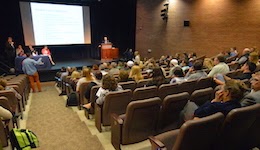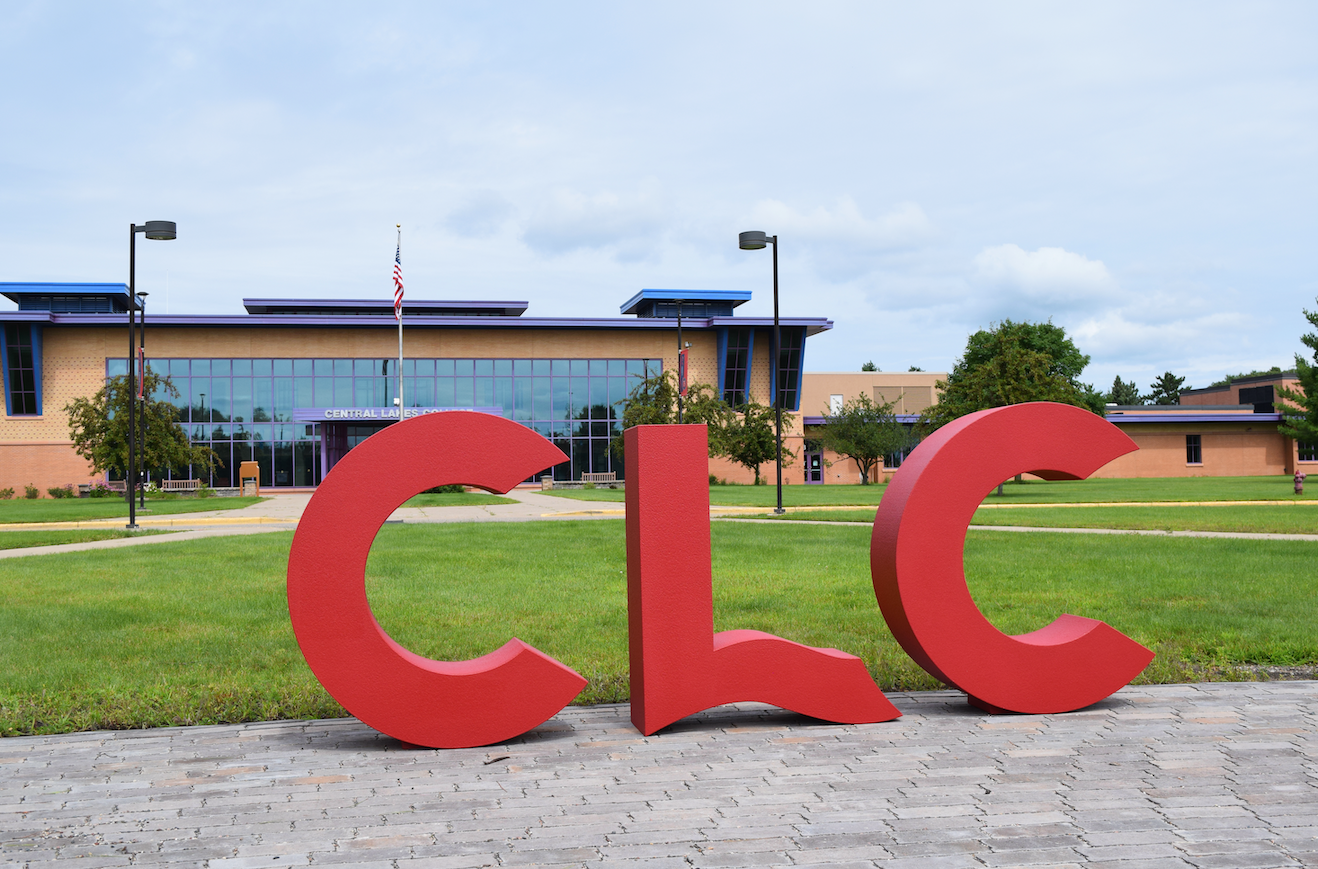State officials
are about to start talks on funding higher education in Minnesota. And as more
and more students struggle to find enough money to pay for education after high
school, leaders want input.
are about to start talks on funding higher education in Minnesota. And as more
and more students struggle to find enough money to pay for education after high
school, leaders want input.
That’s one of
the messages Rep. Bud Nornes, chair of the
Minnesota House Committee on Higher Education Policy and Finance, had for folks
Wednesday during a Rosenmeier Forum held at Central Lakes College.
the messages Rep. Bud Nornes, chair of the
Minnesota House Committee on Higher Education Policy and Finance, had for folks
Wednesday during a Rosenmeier Forum held at Central Lakes College.
The
event was called “Access, Equity and Appropriations: The Financing and the
Future of Higher Education in the State of Minnesota.”
event was called “Access, Equity and Appropriations: The Financing and the
Future of Higher Education in the State of Minnesota.”
Central
Lakes College students, staff, as well as representatives from the city of
Baxter, city of Brainerd, Crow Wing County, and area high schools, packed into
the Chalberg Theatre at CLC’s Brainerd campus to hear the forum.
Lakes College students, staff, as well as representatives from the city of
Baxter, city of Brainerd, Crow Wing County, and area high schools, packed into
the Chalberg Theatre at CLC’s Brainerd campus to hear the forum.
Other speakers
included Laura King, Vice Chancellor and CFO of
MnSCU, and Dr. Toyia Younger, Associate Vice Chancellor of MnSCU.
included Laura King, Vice Chancellor and CFO of
MnSCU, and Dr. Toyia Younger, Associate Vice Chancellor of MnSCU.
It’s
vital the education community start conversations now about the topics, said Rosenmeier
executive director Steve Wenzel.
vital the education community start conversations now about the topics, said Rosenmeier
executive director Steve Wenzel.
“This
topic could not be more timely. Minnesota lawmakers are working out details on
this effort as we speak and we’ll get in on the ground floor of this very
important issue,” he said.
topic could not be more timely. Minnesota lawmakers are working out details on
this effort as we speak and we’ll get in on the ground floor of this very
important issue,” he said.
Currently,
Gov. Mark Dayton is proposing $142M for the Minnesota State Colleges and
Universities System (MnSCU), as requested.
Gov. Mark Dayton is proposing $142M for the Minnesota State Colleges and
Universities System (MnSCU), as requested.
During
Wednesday’s forum, Nornes said he wanted input from the students and staff on
the topic.
Wednesday’s forum, Nornes said he wanted input from the students and staff on
the topic.
Nornes
said paying for a higher education isn’t as easy as when he went to school in
the early 1960s when it took two summers of working on a farm to cover the
bill.
said paying for a higher education isn’t as easy as when he went to school in
the early 1960s when it took two summers of working on a farm to cover the
bill.
“It’s
a different time and students are looking at a lot of different challenges,” he
said.
a different time and students are looking at a lot of different challenges,” he
said.
One
of the biggest challenges: Student debt.
of the biggest challenges: Student debt.
The average
college student will graduate with about $30,000 in student debt, he said.
college student will graduate with about $30,000 in student debt, he said.
Nornes’
goal is to have to state cover half of the bill for college, with the student
covering the other half.
goal is to have to state cover half of the bill for college, with the student
covering the other half.
Further,
in the House’s higher education bill, he wants to see tuition lowered for
technical students.
in the House’s higher education bill, he wants to see tuition lowered for
technical students.
The
state is at a crossroads, King said. “We have to make important decisions on
how to move forward,” she said.
state is at a crossroads, King said. “We have to make important decisions on
how to move forward,” she said.
Every
year, about 410,000 students attend the 31 colleges and universities in the
MnSCU system.
year, about 410,000 students attend the 31 colleges and universities in the
MnSCU system.
Of
those:
those:
* 52,000
are first generation students.
are first generation students.
* 62,000
are American Indian or students of color.
are American Indian or students of color.
* 99,000
are low-income (Pell eligible) students.
are low-income (Pell eligible) students.
* 11,000
are veterans.
are veterans.
The
MnSCU system serves more students in each of the categories than all of Minnesota’s
other higher education options combined, King said.
MnSCU system serves more students in each of the categories than all of Minnesota’s
other higher education options combined, King said.
And
when it comes to students of color and American Indian students, that number is
only getting bigger, she said. Low-income student populations have also seen a
jump in the last decade.
when it comes to students of color and American Indian students, that number is
only getting bigger, she said. Low-income student populations have also seen a
jump in the last decade.
The
population density of the state also has an impact, she said.
population density of the state also has an impact, she said.
Central
Minnesota is expected to see an uptick in population looking forward, while
other parts of the state are seeing a decrease, King said.
Minnesota is expected to see an uptick in population looking forward, while
other parts of the state are seeing a decrease, King said.
“That
has implications on higher education in Minnesota,” she said.
has implications on higher education in Minnesota,” she said.
Still,
King said MnSCU schools are far more affordable than private colleges in the
state. And MnSCU is also ranked 38th of 50 states in administrative
spending each year.
King said MnSCU schools are far more affordable than private colleges in the
state. And MnSCU is also ranked 38th of 50 states in administrative
spending each year.
Younger
said that while state leaders are concentrating on the financial costs of
higher education, her job is to focus on making sure each student is taking the
right courses, has the best support and is successful.
said that while state leaders are concentrating on the financial costs of
higher education, her job is to focus on making sure each student is taking the
right courses, has the best support and is successful.
That
comes through:
comes through:
· * Fostering student learning on campus.
· * Implementing a variety of student service initiatives.
· * Addressing factors that impact success, like being a first
generation student, low income, or a student of color.
generation student, low income, or a student of color.
In
the audience Wednesday, about a dozen students said they were the first member
of their family to go college.
the audience Wednesday, about a dozen students said they were the first member
of their family to go college.
In
closing, Nornes offered some advice to high school students to better prepare
for higher education: Set some money aside and save it.
closing, Nornes offered some advice to high school students to better prepare
for higher education: Set some money aside and save it.
“It
should not be the first day of college and you borrow as much money as you
can,” he said. “Be prepared. It’s not going to be inexpensive.”
should not be the first day of college and you borrow as much money as you
can,” he said. “Be prepared. It’s not going to be inexpensive.”
The
Rosenmeier Center for State and Local Government sponsored the forum.
Rosenmeier Center for State and Local Government sponsored the forum.
View
more photos from the event online: Search “Central Lakes College” on Facebook.
more photos from the event online: Search “Central Lakes College” on Facebook.
 CLC News The news and events from Central Lakes College
CLC News The news and events from Central Lakes College




